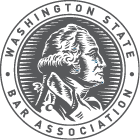Supreme Court Approves a Pilot of Licensing Innovation to Expand Legal Access in Washington
SEATTLE, Wash., Dec. 5, 2024 – Under its authority to regulate the practice of law in Washington, the Washington Supreme Court today entered an order authorizing a timebound, data-driven pilot test of entity regulation. The pilot will allow companies and nonprofits (entities) to offer legal services—under carefully monitored conditions—for the first time in state history. Until now, only individual lawyers and other legal professionals licensed by the Court have been allowed to practice law and own law firms.
Under the order, the Washington State Bar Association (WSBA), which assists in the regulation of the legal profession under the Court’s delegated authority, will implement and run the pilot in partnership with the Court’s Practice of Law Board, which is tasked with proposing to the Court innovative legal service delivery models. Updates about the logistics, timing, and application process for the pilot will be posted at www.wsba.org/pilot-project.
“A lot has changed in 100 years, but not when it comes to legal regulation,” said WSBA Executive Director Terra Nevitt. “Now we are at a regulatory crossroads. The technology revolution is here, as well as exciting new business models. This pilot will help us understand whether and how we can harness that innovation—with public protection as our top priority—to meaningfully expand legal services for Washingtonians.”
What are the opportunities? What are the challenges? The data gathered during the pilot will help the Court assess these questions to decide, ultimately, whether to make a more permanent change to its legal regulatory rules. Two significant benefits to explore are: The ability to better protect the public by bringing emerging technologies and innovations into the regulatory fold; and the ability to better serve the public by meaningfully expanding legal service delivery models.
“We have seen this cautionary tale play out, with innovation outpacing regulation, when it comes to transportation network companies like Lyft and Uber,” said Craig Shank, a member of the Practice of Law Board, which spearheaded the process to develop the pilot for the past several years. “In Washington, we believe it will benefit everyone—lawyers, businesses, and, most importantly, the people who need legal services—for us to proactively gather data. We are looking at potential regulatory changes that are safe, effective, and aligned with the realities of how modern entities and consumers operate.”
The pilot will allow successful applicants to practice law under timebound, limited exemptions from otherwise applicable Court rules and statutes governing the practice of law in Washington. The pilot process includes safeguards such as active monitoring and oversight of each entity by the Court and real-time data collection.
Washington joins Arizona and Utah in exploring entity regulation, as well as many other jurisdictions that are exploring new legal regulatory concepts to expand legal services.
“We have deep justice gaps in Washington, not just for those who cannot afford legal help, but for middle-class families who are not well served by our existing models of legal service,” Nevitt said. “As a legal community, we need to step up to see what’s possible in our highly innovative and technology-forward corner of the world.”
Download a printable copy of this press release.
Entity Regulation Frequently Asked Questions
(For more in-depth information, visit www.wsba.org/pilot-project.)
Q. What is entity regulation?
- Historically, only individuals licensed by the Washington Supreme Court have been allowed to own law firms, share legal fees, and practice law in Washington state. Currently, there are three license types authorized by the Court to practice law: Lawyers, Limited License Legal Technicians, and Limited Practice Officers. The pilot test would, for the first time, authorize entities (companies and nonprofits) with innovative business models to offer legal services to the public under limited exemptions from the otherwise applicable rules and statutes that prohibit entities from practicing law.
Q. How long will the pilot process run?
A. Under the Court’s order, the pilot project will conclude when there is sufficient data and information to make a recommendation to the Court regarding how to proceed with respect to entity regulation. In any event, the pilot project will end 10 years after the date the first entity is granted authority by the Court to participate in the pilot project.
Q. Which entities might apply to participate in the pilot?
A. The goal is to study regulatory innovations relating to entities providing legal services to the public and the impact of those innovations on the accessibility of legal services in Washington. Any entity with an idea for a regulatory innovation related to its delivery of legal services can apply to participate. However, to apply, the entity must propose (1) a specific hypothesis relating to (a) reforming one or more regulatory rules governing entities practicing law and, if applicable, other related rules and (b) that reform’s impact on the accessibility of legal services in Washington and (2) a study to test that reform. Examples of entities that might have interest include businesses that are developing technology applications to streamline legal processes as well as legal-aid organizations that are looking to use innovative service models to expand their ability to help Washingtonians.
Q. Who will operate the pilot test, as ordered by the Court?
A. The Washington State Bar Association (WSBA) and Practice of Law Board (POLB) will collaborate in administering and overseeing the pilot test under the supervision of the Supreme Court, including administering the application and application review process, conducting ongoing monitoring and oversight of participants who have received a limited authorization to practice law from the Supreme Court, and collecting and analyzing aggregate data and information from participants with the intent of making a final data-driven determination regarding whether entity regulation should be implemented. At the end of the pilot test, the POLB and the WSBA will make a recommendation to the Court regarding whether to implement entity regulation and, as appropriate, shall propose regulatory reforms necessary to accomplish the implementation.
Q. How can I find out more about the pilot process and how to apply?
A. www.wsba.org/pilot-project.
About the Practice of Law Board: The Practice of Law Board is a Washington Supreme Court-created board (see GR 25) with responsibilities that include educating the public about how to receive competent legal assistance, considering and recommending to the Court new and innovative avenues to expand licensing to practice law; and receiving complaints alleging the unauthorize practice of law and, as warranted, referring those complaints to with enforcement agencies.
About the Washington State Bar Association
The WSBA operates under the delegated authority of the Washington Supreme Court and exercises a governmental function authorized by the Court to license and regulate the state’s nearly 40,000 legal professionals, including lawyers, limited practice officers, and limited license legal technicians. The WSBA both regulates legal professionals under the authority of the Court and serves its members as a professional association — all without public funding. The WSBA administers the Bar admission process, including the bar exam; provides record-keeping and licensing functions; administers the lawyer discipline system; and provides continuing legal education for legal professionals, in addition to numerous other educational and member-service activities. The Bar’s mission is to serve the public and its members, to ensure the integrity of the legal profession, and to champion justice.






